U.S. Department of Transportation
Federal Highway Administration
1200 New Jersey Avenue, SE
Washington, DC 20590
202-366-4000
Federal Highway Administration Research and Technology
Coordinating, Developing, and Delivering Highway Transportation Innovations
|
LTPP News This newsletter is an archived publication and may contain dated technical, contact, and link information. |
|
| Publication Number: FHWA-HRT-19-007 Date: November 2018 |
Publication Number:
FHWA-HRT-19-007
Issue No: Vol. 13 No. 1 Date: November 2018 |
| Email Distribution List |
|
| Contact |
Customer Service
|
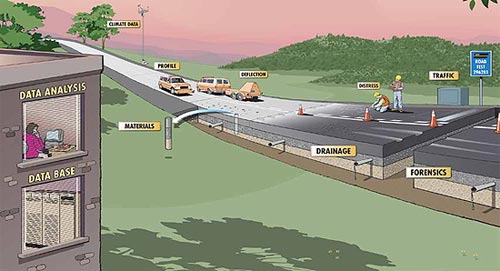
|
LTPP Newsletter |
The 32nd Long-Term Pavement Performance (LTPP) Public Data Release was launched on the LTPP InfoPave™ Web portal on July 5, 2018. This data release includes new collected pavement-performance measurements, data elements not previously released, and updates to the InfoPave Web interface that were designed to improve user access to LTPP data.
The LTPP database is the largest and most comprehensive engineering dataset on modern pavement performance in the world. Newly collected pavement data as well as new data elements are needed to drive innovation and further improve pavement design and performance.
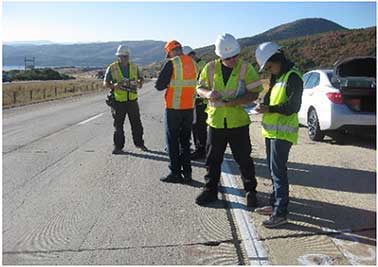
Source: FHWA
LTPP distress raters evaluating concrete pavement on US-40 in Park City, UT (September 2018).
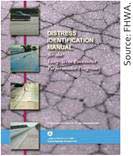 To ensure consistent practices among raters throughout the country regarding distress-data collection, the LTPP program holds an accreditation workshop to calibrate its raters. This weeklong workshop is not a training class to teach raters how to identify and measure different types of pavement distresses. The intent of the workshop is to reach consensus on how to accurately identify the various distresses found on both asphalt and concrete pavements, providing an opportunity to discuss discrepancies that may arise among raters. The Distress Identification Manual (DIM) is used by the raters for field-data collection and office quality-assurance reviews. The DIM is the LTPP program’s most popular product. In fact, the LTPP program is proud that the DIM was among the top 5 digital downloads from the National Transportation Library repository during the first 6 months of 2018, when the manual was downloaded more than 1,000 times!
To ensure consistent practices among raters throughout the country regarding distress-data collection, the LTPP program holds an accreditation workshop to calibrate its raters. This weeklong workshop is not a training class to teach raters how to identify and measure different types of pavement distresses. The intent of the workshop is to reach consensus on how to accurately identify the various distresses found on both asphalt and concrete pavements, providing an opportunity to discuss discrepancies that may arise among raters. The Distress Identification Manual (DIM) is used by the raters for field-data collection and office quality-assurance reviews. The DIM is the LTPP program’s most popular product. In fact, the LTPP program is proud that the DIM was among the top 5 digital downloads from the National Transportation Library repository during the first 6 months of 2018, when the manual was downloaded more than 1,000 times!
The Federal Highway Administration (FHWA) determined that, relative to the LTPPBind 3.1 empirical pavement-performance prediction models published in 2005, the LTPPBind 3.1 models used in LTPPBind Online erred in computing degree days over 10 °C.
This degree-day statistic is used as an input in LTPPBind 3.1 empirical models to determine the high performance-grade asphalt binder as a function of rut depth and other associated parameters. The correction made to the LTPPBind Online software in September 2018 uses the summation of daily high temperatures over 10 °C from April to September of each year as the basis of the degree-day statistic over 10 °C. The LTPP program has verified that this climate input parameter is correct and should be used in the 2005 version of LTPPBind 3.1 high-temperature empirical models. LTPPBind Online now contains these updated climate statistics based on the hourly climate data from Modern-Era Retrospective Analysis for Research and Applications, Version 2.
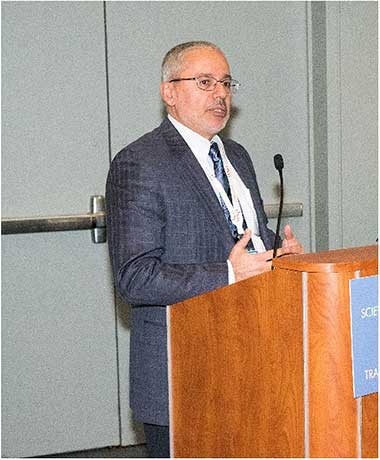
Source: FHWA
Dr. Jean Nehme, team leader for the Long-Term Infrastructure Performance Team.
It has been a little more than a year since Dr. Jean Nehme assumed team-leader responsibilities for the LTPP and Long-Term Bridge Performance (LTBP) programs. Dr. Nehme retired from the Arizona Department of Transportation after 26 years of dedicated service to the citizens of the Grand Canyon State. He has held numerous leadership positions: State bridge engineer; State asset-management engineer; and until his retirement, the director of performance-management and research. He is a licensed professional engineer by the State of Arizona.
After the retirement of the previous team leader Aramis López in September 2016, FHWA management began the process of consolidating the LTPP and LTBP programs under one team because both have similar long-term performance objectives to address the Nation’s infrastructure needs. Thus, the Long-Term Infrastructure Performance (LTIP) Team became official in May 2017.
Though this reorganization combined two teams, both research programs remain distinct, having separate predefined goals and objectives. The LTPP program goal and objectives have not changed since the inception of the program in 1987. The staff with which many of you have worked over the years—Jane Jiang, Jack Springer, Deborah Walker, and Larry Wiser—remain an integral part of the daily operations of the program. They are committed to providing quality data and collaborating with others within and outside FHWA to provide useful products to State partners and others.
FHWA is receiving feedback on LTIP programs from our external partners through the Transportation Research Board (TRB) Committee structure. The TRB LTIP Advisory Committee provides advice to FHWA management on programmatic issues, while the Expert Task Groups (ETGs) provide advice on technical aspects of the LTPP (TRB ETG on Pavement) and LTBP (TRB ETG on Bridge) programs.
Currently, the TRB Committee and technical ETGs meet annually to receive updates and information about both programs. The first set of meetings occurred between the fall of 2017 and spring of 2018. The next meeting of the LTIP Committee will take place in November 2018. The LTIP Committee writes an annual letter report to FHWA’s administrator with its recommendations on priorities for the two programs. The Committee’s first letter report can be found here. Committee and ETG memberships consist of representatives from the State, academia, and industry.
Earlier this year, FHWA awarded a new LTPP data-collection contract to Stantec Consulting Services, Inc. Stantec is collecting pavement-performance data at LTPP test sections throughout North America.
In the past, the program has had four contractors collecting data, but with the reduced number of LTPP test sections being monitored (437 as of this publication), the program determined that a single data-collection contractor was sufficient. To view the data-collection schedule for your State, visit the Field Operations part of LTPP InfoPave™.
The LTPP program, in partnership with the American Society of Civil Engineers (ASCE), is pleased to announce the two winners for the 2017–2018 ASCE-LTPP International Data Analysis Contest. The Graduate Category winner is Muhamad Munum Masud (adviser Dr. Syed W. Haider) from Michigan State University for his paper Use of LTPP SMP Data to Quantify Moisture Impacts on Fatigue Cracking in Flexible Pavements. The Aramis López Challenge Category Award goes to team members Hongren Gong and Dr. Baoshan Huang of the University of Tennessee and Dr. Yiren Sun of Dalian University of Technology for their paper Investigating Impacts of Asphalt Mixture Properties on Pavement Performance Using LTPP Data Through Random Forests.
The winners will be recognized at the TRB Annual Meeting in January 2019 at the LTPP Session. The winners will also present their research papers at the Workshop on Pavement Performance Data Analysis held on January 17, 2019, at the TRB Annual Meeting.
The guidelines for the 2018–2019 contest are being finalized and will be posted on the LTPP’s program and ASCE’s websites in the coming weeks.
The LTPP program is pleased to have received sponsorship from the TRB Standing Committee on Pavements (AFD00) along with cosponsorships from other TRB committees for the LTPP Session. The session will cover the following topics:
You are invited to attend session 1181 on Monday, January 14, 2019, at 10:15 a.m. to receive the latest information about the LTPP program and hear how the program is having an impact on the broader pavement community. Attending the session and visiting the LTPP Booth (627) are good times to visit and meet the LTPP program staff.
A webinar for LTPP State Coordinators will take place after the TRB Annual Meeting. The webinar will allow State Coordinators to receive program updates and recaps of presentations made at the LTPP Session held during the TRB Annual Meeting. An announcement to register for the webinar will be sent via email to State Coordinators in the coming weeks.
It is with sadness that we inform you Dr. James “Jim” Cable passed away this summer. Jim was a long-time supporter and friend of the LTPP program and was not afraid to tell it like he saw it! He served as chair of the ETGs on LTPP Automated Distress Identification and LTPP Special Activities for many years. In addition to his leadership of these ETGs, Jim was also part of the original group that met at the FHWA Turner-Fairbank Highway Research Center in 1984 to discuss a national pavement program to address the pressing needs of the country’s highway infrastructure.
Mining the Pavement Resource (shown below) was written by Jim in 2005 and provided to an LTPP staff member. In this document, Jim shares his insight into the beginnings of LTPP, the challenges for the program in 2005 (and now), and his continued support to fulfill the promise of better roads.
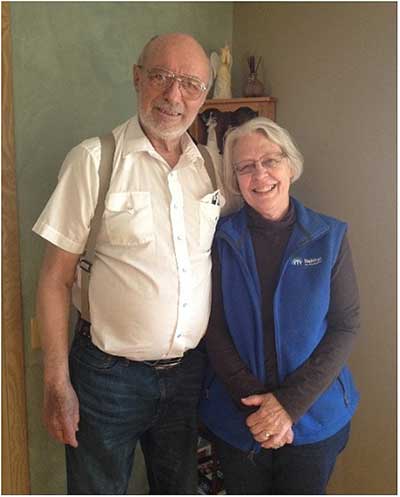
Source: FHWA
Jim Cable and his wife, Liz, at their home in Ames, IA (April 2018).
During a trip to Iowa for training on LTPP profilers, members of the LTPP staff had the opportunity to visit Jim and his wife, Mrs. Elizabeth Cable.
The LTPP staff is grateful to have had the privilege to work with Jim and for the friendship that developed over the years.
12/12/05
On March 12-16, 1984, ninety-five members of the highway industry came together at the Turner Fairbank Center to develop a research plan that would meet the national needs for improved pavement design, and performance through what is now known as the Strategic Highway Research Program. A centerpiece of that effort was the Long Term Pavement Performance (LTPP) program. LTPP sought to provide twenty years of pavement performance measurements, to stimulate data analysis and compare pavement design feature performance.
Over the last twenty-one years many things have changed and many have stayed the course. Highway agency, construction industry and congressional personnel have changed, but the support for LTPP data collection and analysis has remained on track. During this period the FHWA accepted the management of the LTPP program with the assistance of the Transportation Research Board (TRB) LTPP Committee and six Expert Task Groups (ETGs). This system has provided the program with sound data collection plans for distress, deflection and profile data. When the needs were identified, the ETGs have developed traffic and material data collection plans to fill voids in the data base.
The Data Analysis ETG developed the “Tablecloth” plan to use the data base information to analyze the incoming data and begin to identify potential products from the SHRP effort. The Product ETG stepped in to identify products that could be implemented from the database materials, data collection methods, quality control methods and identifiable pavement performance features. As the database grew an ETG was formed to make it more “User Friendly”.
Congress has provided a very limited amount of funding in SAFETEA-LU for LTPP. Steps are being taken to utilize those funds to best populate the database with quality data and continue to collect data in the areas of materials, traffic and profile. In 2009 this will leave uncompleted work in the areas of data analysis, materials testing and traffic data collection for SPS and selected GPS sections. A product plan also remains to be implemented.
The ETGs are committed to finishing the work that is currently identified, and “Fulfilling the Promise” of SHRP. We can only do that with the help of the LTPP Committee. The challenge is to identify the “Champion” and gain the congressional support to complete the work. Who will the next Tom Larson or Frank Francois of this decade be?
Reports
Long-Term Pavement Performance Bind Online User Guide
FHWA-HRT-17-010
October 2017 [PDF]
Investigation of Increase in Roughness Due to Environmental Factors in Flexible Pavements Using Profile Data From Long-Term Pavement Performance Specific Pavement Studies 1 Experiment
FHWA-HRT-17-049
October 2017 [PDF]
Validation of Pavement Performance Measures Using LTPP Data: Final Report
FHWA-HRT-17-089
May 2018 [PDF]
Using Multi-Objective Optimization to Enhance Calibration of Performance Models in the Mechanistic-Empirical Pavement Design Guide
FHWA-HRT-17-104
June 2018 [PDF]
Long-Term Pavement Performance Climate Tool User Guide
FHWA-HRT-17-012
June 2018 [PDF]
Proposed Performance-Prediction Equations and Threshold Triggers for Thin-Overlay Treatments Using The Long-Term Pavement Performance Database
FHWA-HRT-17-111
September 2018 [PDF]
TechBriefs
Validation of Pavement Performance Measures Using Long-Term Pavement Performance Data
FHWA-HRT-17-105
April 2018 [PDF]
Investigation of Increase in Roughness Due to Environmental Factors in Flexible Pavements Using Profile Data From Long-Term Pavement Performance Specific Pavement Studies 1 Experiment
FHWA-HRT-17-120
June 2018 [PDF]
Join us on Facebook® and YouTube® to find FHWA’s latest news, information, and resources.
![]()
![]()
HRDI-30/11-18(Web)E
FHWA-HRT-19-007